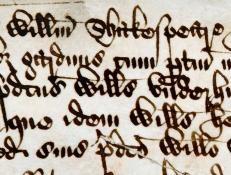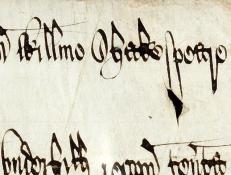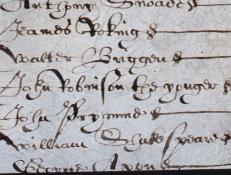To view a sortable list, please visit the Resource
All Documents
May 2-9, 1597
In May 1597, the freehold title to New Place passed from William Underhill to William Shakespeare. This would normally have been recorded in a formal deed of conveyance, signed by both parties.
1597
For details about the 1597 foot of fine, see the general essay for Shakespeare's purchase of New Place. The foot has a useful endorsement (the second image) recording the occasions when the final concord was "proclaimed" in open court, as requi
May 8, 1597
In May 1597, the freehold title to New Place passed from William Underhill to William Shakespeare. This would normally have been recorded in a formal deed of conveyance, signed by the both parties.
November 15, 1597
Lay subsidies were a type of tax based on personal wealth. In London, the collection of subsidies was managed at the local level of ward and parish. Each collection typically generated one lay subsidy roll and one default roll for each ward.
November 4, 1598
On October 25, 1598, Richard Quiney wrote both to Shakespeare, asking for his help in securing a loan of £30 and to his friend Abraham Sturley in Stratford-upon-Avon to let him know the request had been made.
ca. November 4, 1598
While in London in the autumn of 1598, Richard Quiney received five letters from his father Adrian. Four are dated (October 20 and 29, November 10 and 18).
February 4, 1598
In this 1598 survey of those storing grain in Stratford-upon-Avon, “W[illia]m Shackesp[ear]e” is listed as holding 10 quarters of malt.
ca. 1598
The scholar and writer Gabriel Harvey was known and mocked in his lifetime for making copious notes in the margins of printed books. An inventor of words, friend of Edmund Spenser, and rival of Thomas Nashe, he constantly sought to improve himself through note-taking and repetitive reading.
October 1, 1598
Lay subsidies were a type of tax based on personal wealth. In London, the collection of subsidies was managed at the local level of ward and parish.
January 24, 1598
In this letter, dated January 24, 1598, Abraham Sturley wrote to fellow Stratford townsman Richard Quiney about several town matters, including a rumor regarding Shakespeare’s intent to purchase land.















